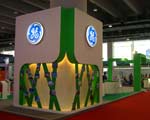Light shines bright for rapid-transit buses
By Xu Jingxi in Doha, Qatar (China Daily)
2012-12-08 09:02
|
|
Guangzhou's rapid-transit bus system has been named as one of nine projects, by the United Nations' Momentum for Change initiative, to be awarded a Lighthouse Activities award.
The system, which carries an average of 850,000 passengers every day in the capital of South China's Guangdong province, was singled out from 100 projects entered for the award at the UN Climate Change Conference in Doha, Qatar.
The Lighthouse Activities awards honor projects that either help curb greenhouse gas emissions or help people adapt to climate change, while at the same time benefit the urban poor.
The bus system - the largest of its type in Asia, and the second-largest in the world - reduced carbon dioxide emissions by more than 45,000 tons in 2010, and is expected to achieve an annual reduction of 86,500 tons for the next decade, said officials.
Xian Weixiong, director of Guangzhou's Transportation Committee, which runs the system, said he was proud it had been given such international recognition as a model of sustainable transportation.
One of the key criteria for selection as a "lighthouse" activity, is that a project must have the potential to be replicated in other countries and communities.
The Guangzhou system's designers - the city's Municipal Engineering Design and Research Institute, and the China office of Institute for Transportation and Development Policy - have already introduced it to other cities at home and abroad, including Ulan Bator in Mongolia, and Kuala Lumpur, the capital of Malaysia.
Xian said more than 130 cities from 36 countries have sent delegations to Guangzhou to learn from the rapid transit system.
The nine winning projects were showcased at a special event on Tuesday at the conference.
The other eight selected projects included the promotion of electric buses and rickshaws in Sri Lanka, energy-efficient brick kilns in Peru, and a door-to-door green energy social enterprise run by women in Uganda.
The Momentum for Change awards began at the UN climate talks in Durban, South Africa, last year.
Jon Bickel, representative of the Peru branch of Swisscontact - the Swiss foundation that funded the brick kilns project in Peru and another eight countries in Latin America - said developing countries will face more serious problems caused by climate change than developed countries, if they fail to act now.
"Countries such as China, India and Brazil are growing very fast, which means they demand a lot of resources and energy.
"Now it's developed countries which produce the largest amount of greenhouse gases, but in future, it will be developing countries," he said during rehearsals for the ceremony.
He praised the Guangzhou system as offering big cities in China the most suitable green solution to traffic congestion.
xujingxi@chinadaily.com.cn






